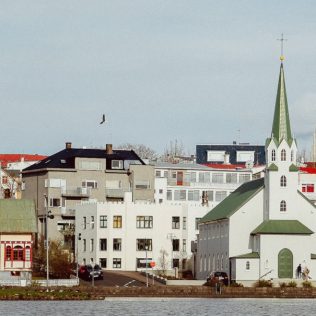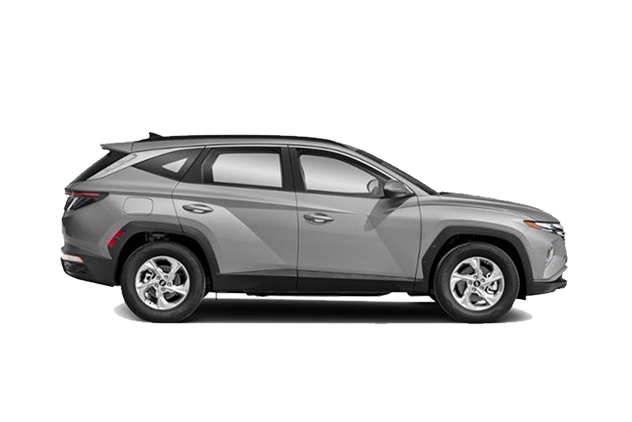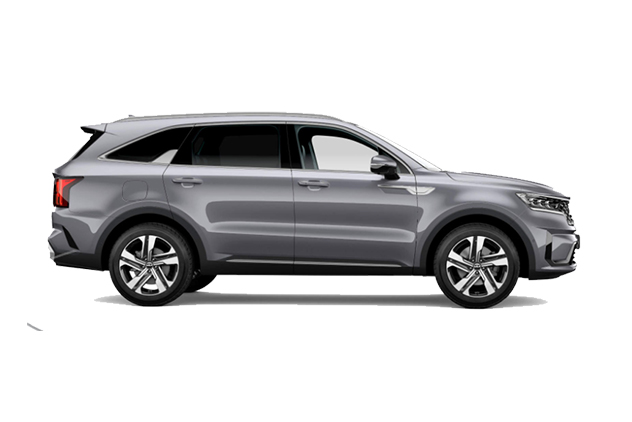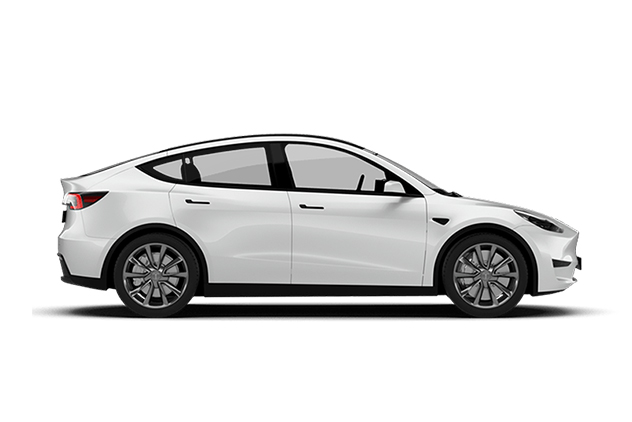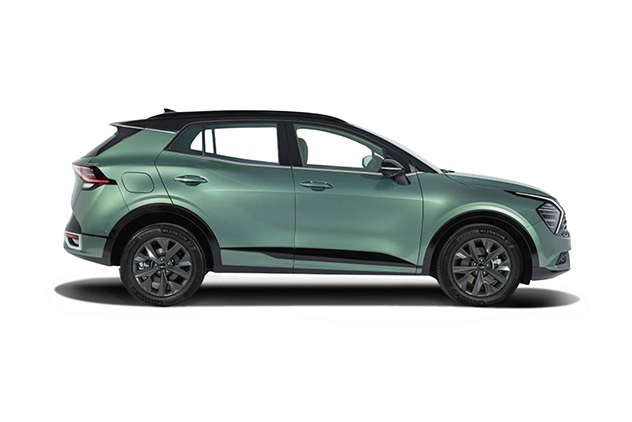Iceland is a small island country in the North Atlantic, known for its stunning natural beauty, including glaciers, volcanos, and waterfalls. The population of Iceland as of June 2025 is 397,929, with immigrants making up around 19% of the population. The majority of people in Iceland live in the capital of Reykjavik, and the surrounding areas.
Living in Iceland can be both challenging and rewarding. The cost of living is relatively high, especially when it comes to housing, food, and transportation. However, Iceland also has a high standard of living, with excellent healthcare and education systems, a low crime rate, and a strong social safety net.
While daily life here comes with realities like harsh winters and limited daylight, many locals will tell you there’s nowhere else they’d rather be. They value the peaceful atmosphere, the cold, fresh air, the high-quality tap water, the warm public swimming pools, and the unique beauty of Iceland’s ever-changing light. And when summer arrives, with its long days and countryside escapes, the hardships of winter are often quickly forgotten.
If you’ve fallen in love with Iceland during a visit or are thinking about moving here, this guide offers a closer look at what living in Iceland is really like.
Table of Contents
- What Is It Like Living in Iceland?
- Cost of Living in Iceland
- Healthcare and Education in Iceland
- Job Opportunities in Iceland
- Moving to Iceland as an LGBTQ+ Person
- Living in Iceland Pros and Cons
- Frequently Asked Questions
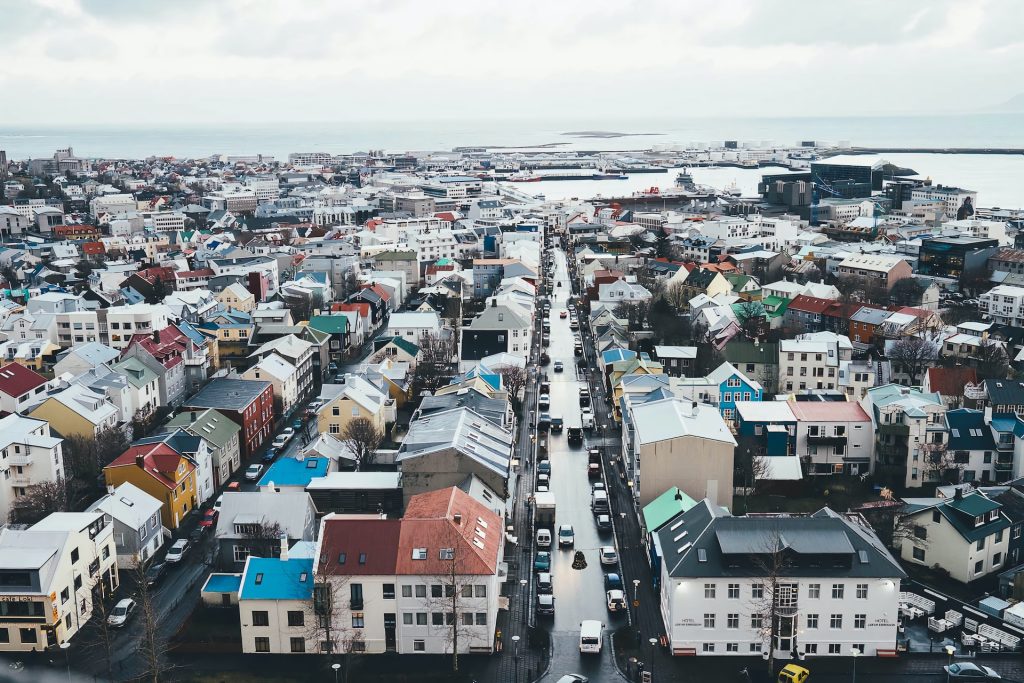
What Is It Like Living in Iceland?
Living in Iceland is something many people dream about, and for good reason. The country is known for its high quality of life, safety, and overall happiness. Iceland regularly ranks among the best places in the world for healthcare, education, and living standards. Many residents say the fresh air, clean water, and beautiful landscapes play a big role in the sense of well-being here.
The economy is stable, offering good opportunities for work and personal growth. Even though Iceland is small, it has a lively cultural scene. Music, literature, and the arts are a big part of daily life, with festivals, concerts, and exhibitions happening all year round.
If you enjoy the outdoors, Iceland has a lot to offer. You can hike across incredible landscapes, ski during the winter, or relax in natural geothermal hot springs. Glaciers, volcanoes, and waterfalls are never far away and are part of what makes the country so unique.
Iceland is also one of the safest countries in the world, with a low crime rate and a welcoming, close-knit community. However, living here does come with challenges. The cost of living is high, and expenses like housing, groceries, and transportation can be much steeper than in many other places. Even so, many people feel the benefits of living in Iceland, like the peaceful environment and strong sense of community, make it all worth it.
Cost of Living in Iceland
There are several reasons why the cost of living in Iceland is high. Iceland is a small island country with a small population, making imported goods and services relatively expensive. The country’s remote location and harsh climate also contribute to higher prices, as transporting goods to and from the island can be difficult and costly.
Iceland also has a high standard of living and a well-developed welfare system, which requires a higher tax burden on residents and businesses. This means that prices for goods and services in Iceland are generally higher than in other countries. Finally, Iceland’s tourism industry has boomed in recent years, which has driven up prices for accommodation, dining, and activities as demand has increased.
Average Monthly Salary in Iceland
The average monthly salary of a working person in Iceland in 2025 is approximately 758,000 Icelandic krona (ISK), which is around $5,997 USD or €5,249 before tax. Salaries in Iceland can vary significantly, ranging from as low as 450,000 ISK (about $3,560 USD or €3,116 EUR) to as high as 1,600,000 ISK (roughly $12,676 USD or €11,080) or more according to Statistics Iceland. The actual monthly earnings of an individual heavily depend on their education level, industry, and experience.
However, it is essential to consider Iceland’s high-income tax rates, which can substantially impact take-home pay. The progressive tax system means that higher earners will see a larger percentage of their income taxed, supporting the country’s robust social services and high quality of life.
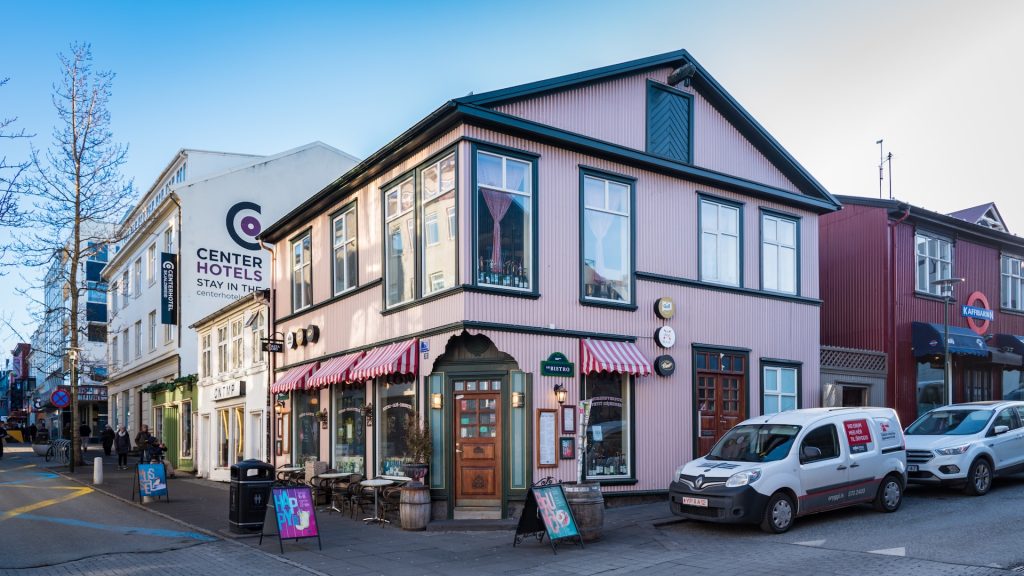
Tax System and High Income Tax in Iceland
Iceland’s tax system is progressive, with higher income earners paying a higher percentage of their earnings in taxes. As of 2025, the personal income tax in Iceland is divided into three brackets:
- 31.49% on income up to 472,005 ISK per month.
- 37.99% on income between 472,006 ISK and 1,325,127 ISK per month.
- 46.29% on income exceeding 1,325,127 ISK per month.
These rates include both national and municipal taxes, which can vary slightly depending on the municipality. Each individual is entitled to a personal tax credit of 68,691 ISK per month, which helps reduce the tax burden. Unused tax credits can be transferred to a spouse.
In addition to income tax, Iceland imposes a capital gains tax of 22%, and corporate income is taxed at 20% for limited liability companies. Employees must also contribute 4% of their gross income to a mandatory pension fund, with employers contributing an additional 11.5%.
Despite the high tax rates, Iceland offers extensive public services, a high standard of living, and strong social support systems, funded by these tax revenues. High earners contribute significantly, but the benefits of living in Iceland, including excellent healthcare, education, and social welfare programs, often outweigh the financial burden.
Housing Rental Average Price in Iceland
Housing costs in Iceland can vary significantly depending on the location and type of accommodation. Here’s a breakdown of rental prices in 2025:
- Reykjavik (Expensive Area):
- 1-bedroom apartment: 275,476 ISK ($2,176 USD/€1,901)
- 3-bedroom apartment: 395,541 ISK ($3,125 USD/€2,729)
- Reykjavik (Normal Area):
- 1-bedroom apartment: 252,500 ISK ($1,994 USD/€1,743)
- 3-bedroom apartment: 341,272 ISK ($2,696 USD/€2,355)
- Akureyri:
- 1-bedroom apartment: 220,00 ISK ($1,738 USD/€1,518)
- 3-bedroom apartment: 263,000 ISK ($2,078 USD/€1,815)
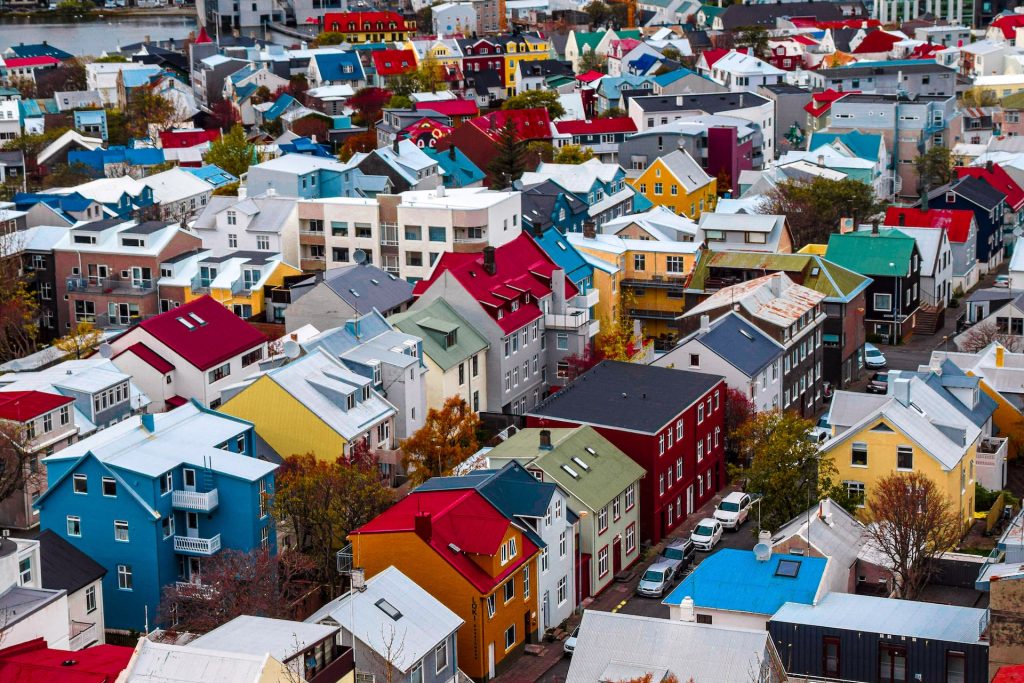
Average Food Prices in Iceland
Iceland food can also be quite expensive, especially if you prefer to eat out:
- Cheap fast-food meal per person: ≈ 2,500 ISK ($20 USD/€17)
- Cheapest small Domino’s Pizza ≈ 1,890 ISK ($15 USD/€13)
- Dinner at a mid-range restaurant per person ≈ 9,000 ISK ($71 USD/€62)
- Dinner at a finer restaurant per person≈ 12,000 ISK ($95 USD/€83)
If you are willing to cook at home and shop at local grocery stores, you can save money; here is a food price average from grocery stores in Iceland:
- 1 litre milk ≈ 220-300 ISK ($1.57–$2.14 USD/€1.47–€2.00)
- 1 kg apples/oranges/bananas ≈ 325-500 ISK ($2.32–$3.57 USD/€2.17–€3.33)
- 1 loaf of bread ≈ 400 ISK ($2.86 USD/€2.67)
- 12 eggs ≈ 696-800 ISK ($4.97–$5.71 USD/€4.64–€5.33)
- 1 kg tomatoes ≈ 590 ISK ($4.21 USD/€3.93)
- 1 kg potatoes ≈ 375 ISK ($2.68 USD/€2.50)
- 500 g cheese ≈ 1,200 -1,500 ISK ($8.57–$10.71 USD/€8.00–€10.00)
- 1 kg ground beef ≈ 4,000 ISK ($28.57 USD/€26.67)
- 1 kg Icelandic lamb ≈ 3,000-6,000 ISK ($21.43–$42.86 USD /€20.00–€40.00)
- 1 kg chicken ≈ 1,800-2,900 ISK ($12.86–$20.71 USD/€12.00–€19.33)
Average Transportation Cost in Iceland
Transportation in Iceland can also be pricey, especially if you need to purchase a car. However, public transportation is available in Reykjavik and some other cities in Iceland, and the monthly bus ticket for an adult is approximately 11,200 ISK for adults, with discounts available for youth and elderly.
Iceland car rental options exist for those who want to explore areas outside of the capital, and the rental price depends heavily on the seasons and the length of the rental. Gasoline is also more expensive in Iceland than in many other countries. At the current time of writing it’s at currently at 306 ISK ($2.44 USD/€2.12) per litre. You can check the live Gasoline price in Iceland on this website.
Other expenses in Iceland can include healthcare, insurance, and utilities. Healthcare is cheap for Icelandic citizens and residents; health Insurance is also required for anyone living in Iceland, and utility costs can vary depending on the size of your home and the time of year.

Healthcare and Education in Iceland
Healthcare in Iceland
Iceland boasts a comprehensive and efficient healthcare system, largely funded by the state. Residents enjoy access to a wide range of medical services, though there are costs associated with some aspects of care. Visits to a health center typically cost around 500 ISK ($3.57 USD/€3.33) during daytime hours for insured patients, while emergency treatments can vary significantly in price, generally starting from 2,000 ISK ($14.29 USD/€13.33). Iceland’s universal healthcare system ensures that most medical services are affordable, but it is essential to register as a resident to access these benefits. Registration grants individuals an ID number, which is necessary for receiving healthcare services.
However, dental care in Iceland is notably expensive compared to other medical services. Routine dental check-ups, procedures, and treatments can be a substantial financial burden, as dental care is not fully covered by the state. A basic examination can run you about 9,000 ISK ($65 USD/€60), while a composite filling can cost about 35,000 ISK ($250 USD/€233). This high cost often leads residents to seek supplemental dental insurance or to pay out of pocket for significant dental work.
Education in Iceland
Iceland places a strong emphasis on education, providing high-quality schooling from primary levels through to university. Public education is generally free of charge for residents, including tuition at public universities such as the University of Iceland and the University of Akureyri. However, there is an application fee for these institutions, which typically amounts to around 75,000 ISK ($535 USD/€500) per academic year.
Private universities, like Reykjavik University, charge tuition fees that can be significantly higher, particularly for international students. These fees can range from 655,000 ISK ($4,700 USD/€4,350) for EU/EEA citizens to around 1,206,000 ISK ($8,600 USD/€8,040) per term for non-EU/EEA students. Despite these costs, Iceland’s education system is renowned for its high standards and is an attractive option for both local and international students
Job Opportunities in Iceland
Iceland has a small but growing job market with a focus on specialized industries. For citizens of the EU, EEA, EFTA, or the Faroe Islands, it’s relatively easy to live and work in Iceland without needing a special work permit. However, if you’re from outside these regions, it can be challenging to get a job due to strict work visa requirements and limited openings for foreign labor.
To qualify, non-EEA applicants usually need:
- A pre-approved job offer in hand
- Expert-level skills in a field where no suitable local or EEA candidate is available
- A university degree or equivalent professional credentials
- Employer support through the application process
Despite the hurdles, there are opportunities in the following sectors:
- Tourism and hospitality: Iceland’s tourism industry remains one of the biggest employers. Jobs are available in hotels, restaurants, tour guiding, and transportation services, especially during peak travel seasons.
- Fisheries and seafood processing: A traditional cornerstone of the economy, the fishing industry offers roles in fishing operations, fish processing plants, and export logistics.
- Renewable energy: With abundant geothermal and hydropower resources, there’s demand for engineers, project managers, and specialists in energy systems and sustainability.
- Technology and innovation: Iceland’s tech sector is growing, particularly in software development, gaming, biotech, and IT services. Some international companies operate in English and actively seek global talent.
- Healthcare and public services: Qualified medical professionals, including nurses and doctors, are in demand. However, proficiency in Icelandic is often required for public-facing roles.
- Education and academia: There are teaching and research opportunities, especially at the university level. Again, many of these roles require Icelandic language skills unless working in international programs.
While Icelandic is the primary language, some companies operate in English and seek international talent. However, proficiency in Icelandic language may be required for certain positions, particularly those in the public sector.
Work Visas and Permits in Iceland
For non-EEA/EFTA citizens, getting a job in Iceland requires a residence permit for work purposes, which must be approved before entering the country. The process includes:
- Securing a job contract in advance
- Submitting documentation proving expertise or specialization
- Getting sign-off from the appropriate Icelandic trade union
- Employer support throughout the application process
Processing times can take up to 90 days or longer, and most permits are issued for one year with the possibility of renewal. For more details, you can refer to Iceland immigration office website and Directorate of Labour.

Moving to Iceland as an LGBTQ+ Person
Iceland is widely seen as one of the safest and most LGBTQ+ friendly countries in the world. It legalized same-sex marriage in 2010, bans discrimination based on sexual orientation and gender identity, and allows legal gender changes without surgery. The general attitude in society is progressive, and many queer and trans residents report feeling safe, respected, and welcomed.
That said, like anywhere, experiences can vary. Icelanders are often reserved at first, but tend to be kind, supportive, and inclusive once you get to know them. For those looking to connect with the local queer community, Samtökin ’78, The National Queer Organization of Iceland, is a great resource. Their office in Reykjavík offers events, advocacy, and peer support groups, including trans-specific and transfem meetups.
If you’re a queer person moving from the U.S., it’s important to note that while Iceland’s legal and cultural climate is generally safe and supportive, immigration requirements still apply. U.S. citizens will need a valid reason to stay long-term, such as work, study, or family reunification, and may need to secure a residence permit before arrival. For trans individuals or anyone seeking gender-affirming care, Iceland’s healthcare system offers support, but wait times and access may depend on residency status and public system registration.
Living in Iceland Pros and Cons
Living in Iceland has its own set of pros and cons that potential residents should consider before making a move:
| Pros | Cons |
| ➝Safe place to live ➝Endless natural beauty ➝High standard of living ➝Unique culture ➝Wide range of outdoor activities ➝Clean environment | ➝High cost of living ➝Limited job market for foreigners ➝Outside of EU/EFTA or the Faroe Islands ➝Harsh weather ➝A possible feeling of Isolation ➝Language barrier ➝High dental care costs |
Pros of Living in Iceland
- Safety: Iceland is considered one of the safest countries in the world, with low crime rates.
- Natural beauty: Iceland is renowned for its stunning natural landscapes, including glaciers, geysers, and waterfalls.
- High standard of living: Iceland has a high standard of living with good healthcare and education systems.
- Unique culture: Iceland has a rich cultural heritage with a unique language, music, and literature.
- Outdoor activities: Iceland offers a wide range of outdoor activities, such as hiking, skiing, and fishing
Cons of Living in Iceland
- High cost of living: Iceland is one of the most expensive countries to live in, with high costs for food, housing, and transportation.
- Limited job market: The job market in Iceland is relatively small, and it may be difficult for foreigners to find work.
- Harsh weather: Iceland experiences cold and dark winters, with limited daylight hours, and unpredictable weather patterns.
- Isolation: Iceland is located far from other countries and can feel isolated, especially during the long winter months.
- Language barrier: Icelandic is the official language of Iceland, and while many Icelanders speak English, it can still be challenging for foreigners to navigate daily life without knowing the language.
- High Dental care costs: Dental care in Iceland is expensive compared to other medical services. Routine dental check-ups and treatments can be a significant financial burden, as they are not fully covered by the state healthcare system.
Living in Iceland FAQs
-
- Is Iceland an expensive place to live?
Yes, Iceland is one of the most expensive countries to live in. Costs for housing, groceries, dining out, transportation, and imported goods are high. However, wages and public services like healthcare and education help offset some of the burden.
- Is Iceland an expensive place to live?
-
- Is it cheaper to live in Iceland or the UK?
In general, living in the UK is cheaper than living in Iceland. Iceland has higher prices for groceries, rent, and dining out, largely due to its remote location, small population, and reliance on imports.
- Is it cheaper to live in Iceland or the UK?
-
- When did people start living in Iceland?
The first permanent settlers arrived in Iceland around 874 AD, primarily Norsemen from Scandinavia. Settlement expanded over the following decades, and Iceland’s parliament, the Althing, was established in 930 AD, making it one of the oldest in the world.
- When did people start living in Iceland?
-
- Is it difficult to move to Iceland?
It depends on your nationality. Citizens of the EU, EEA, EFTA, and Faroe Islands can move and work freely. For others, it’s more difficult and requires a residence permit and a job offer in a specialized field. Iceland does not have a general immigration program for unskilled workers.
- Is it difficult to move to Iceland?
-
- Is Iceland friendly to foreigners?
Yes, Iceland is generally considered friendly and welcoming to foreigners. English is widely spoken, and many Icelanders are open to meeting people from other countries. However, integration can be slower in rural areas, and learning Icelandic is helpful for social and professional life.
- Is Iceland friendly to foreigners?
-
- What is the minimum wage in Iceland?
As of 2025, Iceland does not have a government-mandated minimum wage. Instead, wages are determined by collective agreements between unions and employers. The base monthly wage for full-time unskilled work is typically around 351,000 ISK (~$2,775 USD/€2,430) but varies by industry.
- What is the minimum wage in Iceland?
-
- Do people in Iceland pay for electricity?
Yes, residents pay for electricity, but costs are relatively low compared to other countries. Most electricity in Iceland comes from renewable geothermal and hydropower sources, which helps keep prices stable and sustainable.
- Do people in Iceland pay for electricity?
-
- How much does a house cost in Iceland?
Housing prices vary by location. In 2025, the average price for a 1-bedroom apartment in Reykjavik is around 275,000 ISK/month ($2,176 USD/€1,901 for rent). Buying property can range from 40 million to over 100 million ISK ($316,000–$790,000 USD/€276,000–€690,000), depending on size, condition, and location.
- How much does a house cost in Iceland?
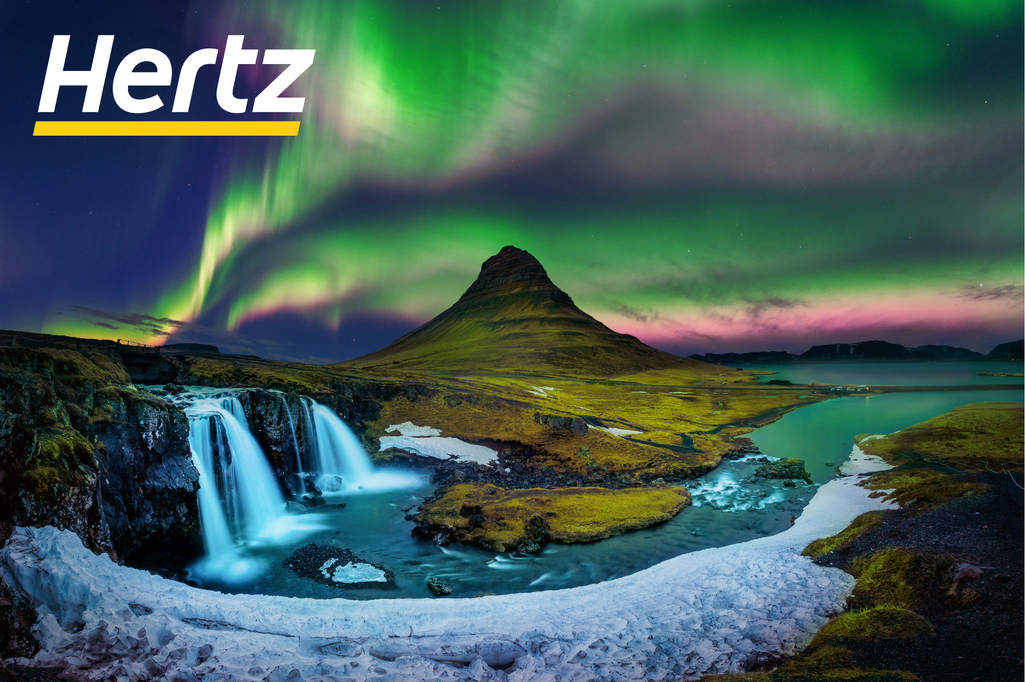
Is Living in Iceland Right for You?
Living in Iceland can be a unique and rewarding experience. Iceland is known for its natural beauty, outdoor activities, and vibrant culture. The country offers a high quality of life with excellent healthcare, education, and social services. The population is small and close-knit, easily connecting with people and building strong relationships.
However, the cost of living in Iceland is relatively high, especially for imported goods, making it challenging to manage finances. The weather can also be unpredictable and harsh, especially during winter in Iceland. Despite these challenges, Iceland’s unique culture, friendly people, and stunning landscapes make it a desirable place to live for many people.
